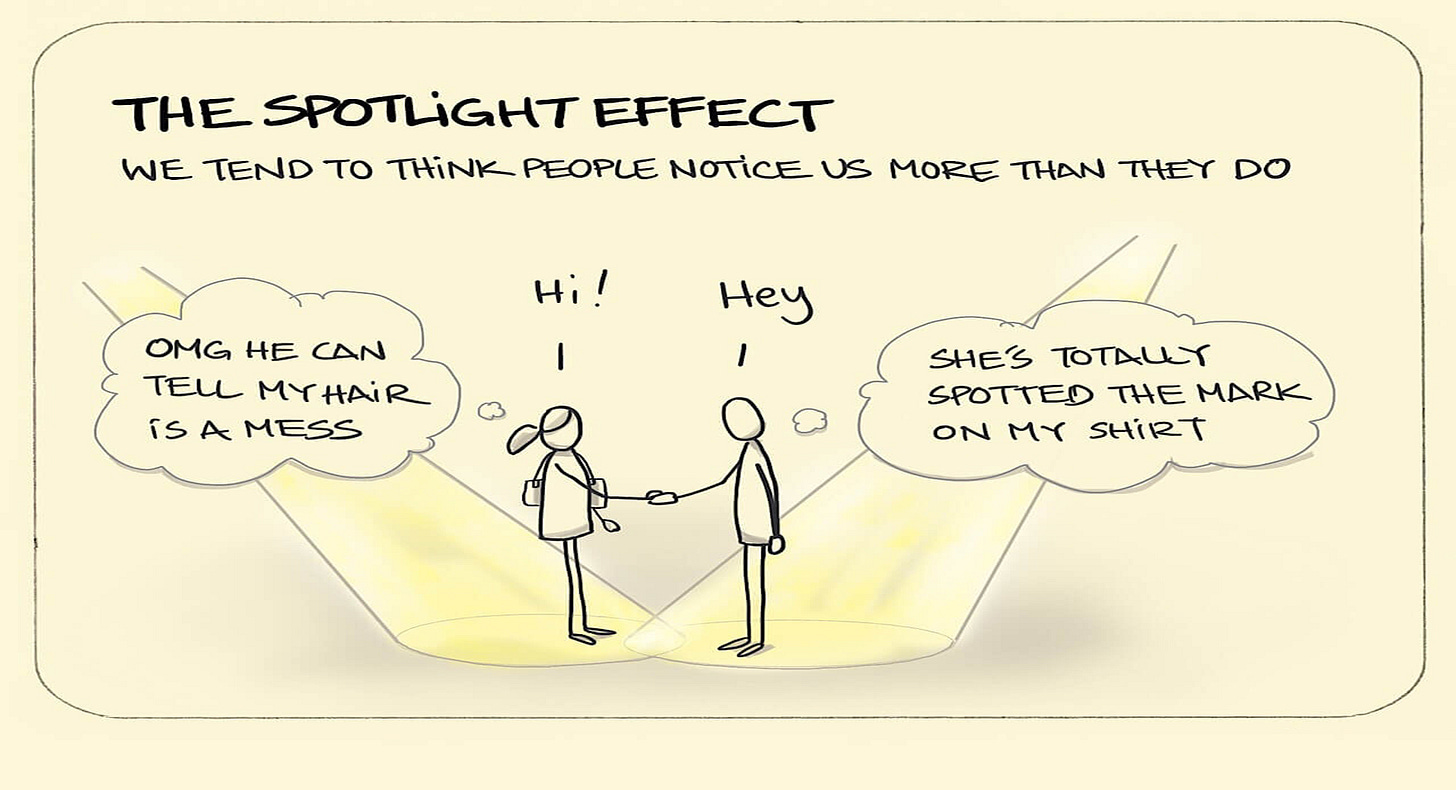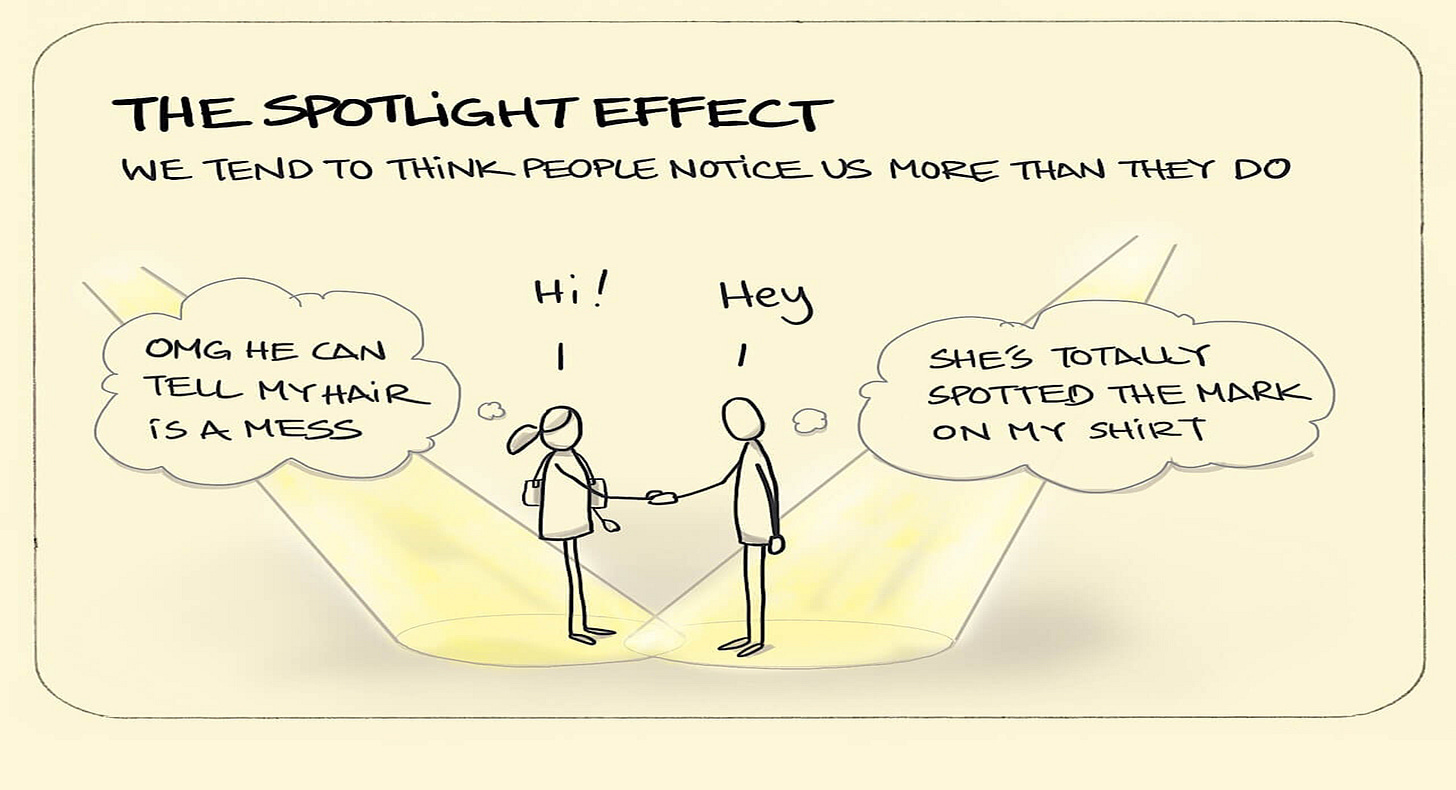7 Psychology Hacks I Wish I Knew Earlier (And How You Can Use Them Today)

Save your time
Your nerves aren’t as visible as you think.
Your brain remembers peaks and endings, not full experiences.
Pairing something boring with something enjoyable makes it easier.
Nobody is analyzing you as much as you fear.
Starting is the hardest part, so make it stupidly easy.
Expectations shape reality.
Small mistakes make you more likable.
1. The Illusion of Transparency (People Can’t Read You Like a Book—Even If You Think They Can)
Have you ever felt like your nerves were screaming at everyone in the room?
You stand up to talk, and suddenly, your body pulls a fast one on you.
Hands getting that weird damp feeling, like you just high-fived a fish.
That thing your voice does where it sort of… cracks? And wobbles?
A pause that feels so long, you’re convinced you just invented dead air.
And in your head, it’s clear as day—everyone sees it. It’s written all over you.
Except… not really.
What’s Actually Happening?
So, back in 2003, some smart people at Cornell decided to mess with people’s minds a little. They had participants give speeches and then asked them how obvious their nerves were.
The speakers Thought they were an absolute mess, practically broadcasting panic on a frequency only dogs could hear.
The audience Barely noticed.
This is called the Illusion of Transparency, and it’s basically your brain being a bit of a drama queen. You assume your emotions are spilling out for everyone to see, but most people? Too busy worrying about their own weird hand movements and nervous energy to analyze yours.
It’s like a one-way mirror—everything feels exposed on your side but from the outside? Not nearly as obvious as you think.
2. The Peak-End Rule (Why the Last Few Moments Matter Way More Than the Rest)
The trip was going great—sunny weather, zero responsibilities, maybe even a perfect playlist backing the whole thing.
Then.
Missed flight. Overpriced airport sandwich. That weird guy breathing way too close in the security line.
And just like that? Feels like the whole vacation sucked.
What’s Going On?
A guy named Daniel Kahneman, who happens to have a Nobel Prize, figured out something interesting—your brain is terrible at remembering full experiences.
Instead, it holds onto:
The most intense moment (the “peak,” whether it’s good or bad).
The ending.
That’s it. Everything else? Blurry background noise.
Which is why:
That concert with a so-so setlist still feels amazing if the encore was killer.
A so-so movie can feel incredible if the last ten minutes hit you in the gut.
A great date can turn awkward and ugh if it ends on a weird note.
Your brain doesn’t keep a full record—it just cherry-picks a couple of highlights and runs with them.
3. Dopamine Pairing (Trick Yourself Into Liking the Boring Stuff)
Why is scrolling through your phone the easiest thing in the world, but answering emails feels like climbing a mountain?
It’s because of the little chemical gremlin in your brain that decides what feels fun and what feels like an absolute chore.
See, your brain really likes rewards. Fast ones. Easy ones. That’s why checking notifications feels good, and folding laundry makes you want to take a nap.
So what’s The Loophole you ask?
There’s this thing called temptation bundling, which is just a fancy way of saying, “Smash something boring together with something enjoyable, and suddenly, it sucks less.”
Doing Treadmill Feels Boring? Only let yourself listen to your favorite podcast when you’re running.
Hate doing dishes? Make it the time you catch up on your guilty pleasure show.
Your brain starts linking the “ugh” thing with the “this is kinda nice” thing and before long It stops feeling like a struggle.
It’s like putting cheese on broccoli—eventually, you don’t even mind the broccoli.
4. The Spotlight Effect (People Aren’t Watching You as Much as You Think)
You replay conversations. Obsess over a joke that maybe didn’t land. Convinced everyone is still talking about that one awkward moment.
They won’t.
What’s the Deal?
So, there’s this psychologist, Thomas Gilovich, who ran an experiment where he made people wear a deeply embarrassing t-shirt (Barry Manilow’s face, because why not?) and walk into a room.
The wearers were mortified. Convinced everyone would stare, whisper, judge.
Less than 25% of people even registered the shirt.
People aren’t analyzing you like some kind of character study. They’re just as lost in their own world as you are in yours.
Which means that joke you think flopped? Forgotten. That awkward handshake? Not a single person cares.
You’re not a main character in everyone else’s story. You’re barely a footnote.
5. The 2-Minute Rule (How to Trick Your Brain Into Starting)
You tell yourself you’ll do it later. After a snack. Maybe after one more episode.
And Three hours later you have evaporated into the abyss.
Here’s a Stupidly Simple Fix
James Clear, the guy who wrote Atomic Habits, has this little trick:
If something takes less than 2 minutes, just do it.
If it’s longer, just start for 2 minutes.
That’s it. No commitment beyond that.
Want to write? Just open the doc and type literally one sentence.
Need to work out? Just put on your gym clothes.
Are emails piling up? Respond to one.
6. The Pygmalion Effect (Other People’s Expectations Shape You More Than You Think)
Why do some students outperform their peers—even when they have the same intelligence?
Because someone expected them to.
What’s Going On?
When people expect more from you, you absorb that.
A study had teachers treat certain students like future geniuses. The catch? They weren’t. Their names were just picked at random.
A year later? Those students had actually improved more than the others.
Expectations shape reality.
Which is why:
If people assume you’re lazy, you might start acting that way.
If you’re surrounded by people who push themselves, you tend to follow.
If you convince yourself you’re capable, you become capable.
7. The Pratfall Effect (Why Being a Little Clumsy Makes You More Likable)
Flaws Stick. Perfection Feels Fake.
So, some researchers back in 1966 decided to test this out. They had two groups of people watch different recordings.
One group saw someone who had everything together—smooth, polished, basically a walking LinkedIn profile.
The other watched someone just as capable, but with minor slip-ups—dropped a pen, stumbled over a word, tiny, forgettable mistakes.
Turns out, the second group? People liked them way more. The slight messiness made them real.
Nobody trusts perfect. Perfection is weird. Makes people uneasy, even. Like something’s off. A person who makes tiny mistakes Feels normal. Feels like someone you could actually talk to.
You don’t need to present some flawless version of yourself. People connect with what’s real.
Wait a Sec
If you want to read more stories like this,
Join 790+ Curious People like you in my newsletter:

Your time means a lot to me, and I promise not to waste it.
Thank you!









